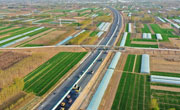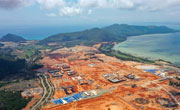China achieved its goal of poverty alleviation, which is not easy -- Interview with Emanuela Hanes, Austrian specialist on China issues
After publication of the white paper "Poverty Alleviation: China's Experience and Contribution", Emanuela Hanes, an Austrian specialist on China, told Guangming Daily that as China is the biggest developing country in the world, it was not easy for the country to have achieved its goal of poverty alleviation.
Hanes had worked in China for many years. Currently, she provides cross-cultural training, strategic consulting services for Austrian, German, and Swiss enterprises, and helps them find opportunities for cooperation in China. Hanes has been interested in Chinese culture and history for a long time, and started learning Chinese. Not only did she study and work in China, she also visited Sichuan, Yunnan, and many other places in the country. She has in-depth knowledge of China’s national conditions, especially of its poverty alleviation work.
When living in Yunnan from 2011 to 2012, Hanes personally witnessed many remote mountain villages gradually getting access to highways, and electricity, as well as constantly improving daily supplies. However, poor medical services and shortage of drinking water were the biggest problems in most remote regions. What is most memorable to her is the white paper "Poverty Alleviation: China's Experience and Contribution” indicated that China now has sufficient supplies of drinking water. The white paper also pointed out, providing supplies of medical goods and materials, and improving the educational levels of remote mountain areas are matters of priority to the government's poverty alleviation work. This is not only important, but encouraging.
When Hanes was in China, she noticed farmers from Yunnan, Sichuan, and other provinces had to leave their hometowns to for better incomes. They headed to coastal regions such as Shenzhen and Guangzhou, and only the elders and children remained in the villages. Hence, she finds the white paper's proposal to create job opportunities in rural areas consoling: "Helpinging farmers earn stable income is the key to sustainable poverty alleviation.”
Hanes said, back when she worked in Yunnan, many local residents still lived in small mountain villages with poor living conditions. However, with the advancement of the western development strategy, there were tremendous improvements in highways, bridges, and other infrastructures in these regions. In addition, governments also subsidized local residents to install solar water heaters. Local residents' living conditions have hence been greatly improved. Hanes said, her Canadian colleague received a special stove provided by the government. Using this type of stove to cook can reduce wood burning and can effectively protect the forest. Similar measures greatly improved rural people’s lives. When Hanes went back to Yunnan in 2016, she could feel the drastic changes in transportation. Not only was public transportation gradually perfected, many remote mountain villages were connected to highways.
Hanes thinks the global poverty alleviation task must be completed through the cooperation of all nations. Regarding this question, American scholar Donald Lewis proposed the possibility of combining the "Belt and Road" Initiative and the United Nations Sustainable Development Goals. Hanes believes this is a great direction which can reinforce the goals of poverty alleviation and sustainable development, and let them make progress together. To Hanes, the "Belt and Road" Initiative is a great platform. If it can serve as the basis in reinforcing the cooperation of the United Nations and other international organizations in global poverty reduction, then it can create a win-win situation. Hanes hopes this approach can help more impoverished populations in the world overcome poverty.
Contributed by: Jiao Shousong, Vienna-based reporter of Guangming Daily
[ Editor: JYZ ]










More From Guangming Online
Medics from Fujian leave for Shanghai to aid in battle against COVID-19 resurgence
New int'l land-sea transport service to Indo-China Peninsula launched
Another makeshift hospital under construction in Shanghai
Tourists view tulips in Suiping County, Henan
In pics: blooming gagea flowers on grassland in Zhaosu, Xinjiang
Greek workers stage 24-hour general strike over high prices